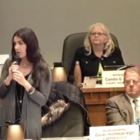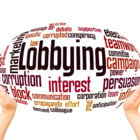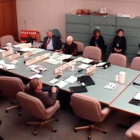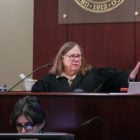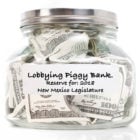2019 legislative session
House ups the ante in lobbyist regulation bill
|
Rep. Dayan Hochman-Vigil responds to questions about HB 131 on the House floor, while her fellow Democrat and co-sponsor, Sen. Jeff Steinborn, looks on. It was originally just a simple bill requiring lobbyists to report to the Secretary of State all the bills they lobbied on, and their position on the bills if they took one, within 14 days of the end of the session. But before HB 131 was passed by the House of Representatives last night 62-0, it was amended to include a sweeping ban on lobbyist spending on lawmakers during a legislative session. “My intention is to limit a lobbyist from making any expenditure, whether they’re providing a committee dinner, whether they’re putting drinks in your office, whether they’re putting cookies on your table, it’s removing them from the process,” Republican Minority Leader Jim Townsend of Artesia said when explaining the amendment. State legislators are already barred from soliciting campaign contributions from January 1 through the end of each legislative session.
